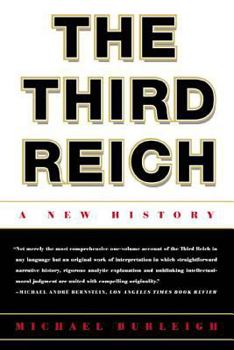The Third Reich: A New History
Select Format
Select Condition 
Book Overview
Michael Burleigh's The Third Reich presents a major study of one of the twentieth century's darkest periods.
Until now there has been no up-to-date, one-volume, international history of Nazi Germany, despite its being among the most studied phenomena of our time. The Third Reich restores a broad perspective and intellectual unity to issues that have become academic subspecialties and offers a brilliant new interpretation of Hitler's evil rule. Filled with human and moral considerations that are missing from theoretical accounts, Michael Burleigh's book gives full weight to the experience of ordinary people who were swept up in, or repelled by, Hitler's movement and emphasizes how international themes for Nazi Germany appealed to many European nations. It also focuses on the Nazi's wartime conduct to dominate the Continental economy and involve gigantic population transfers and exterminations, recruitment of foreign labor, and multinational armies.Customer Reviews
Rated 5 starsA Great Summation of the Effects of Nazi Destructiveness
"The Third Reich: A New History" does not emphasize Hitler , nor the politics or personalities within the Nazi party itself, and, consequently, Burleigh rushes through the Nazi seisure of power. The book, rather, concentrates on the impact National Socialism had on the lives of people both within Germany and throughout Europe. To learn about Hitler, the Nazi organization itself, or how Hitler molded the party to his will,...
4Report
Rated 5 starsExcellent Analysis of Nazism
The literature on the Third Reich and related phenomena is immense; there are tens of thousands of books on the Holocaust alone. Michael Burleigh has done a superb job of distilling this complex literature and providing a clear way of understanding the phenomenon of Nazism. Readers picking up this book should be aware that this is not, however, a conventional narrative history. Rather, it is a series of chronologically...
3Report
Rated 5 starsRevelatory
As a general reader with only an occasional interest in this period, I was drawn to this account as a result of the many glowing reviews, both here and elsewhere. I hoped to find the answers to the perennial question, "Why?" and amazingly found it - in its many shades - in this book. Indeed, this interpretative history seems to me to be more preoccupied with the "How?" and "Why?" issues than simply the dry retelling of the...
1Report
Rated 5 starsdestined to become a classic
When it comes to popular history on the Nazi era, a subject about which very little deviation from the norm is tolerated, the one book that you'll most often see cited is William Shirer's Rise and Fall of the Third Reich. A perfectly acceptable relic of its time, this book treats Hitler and the Nazi Party as complete aberrations, imposed on a slumbering Germany by a freakish set of circumstances. This view, understandable...
3Report














